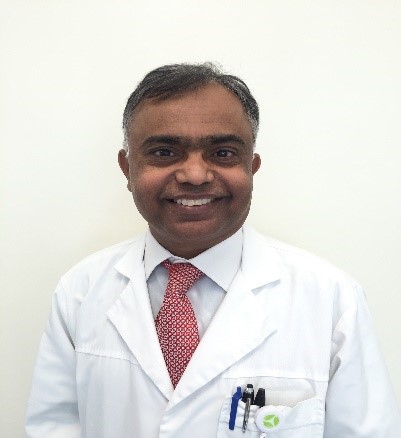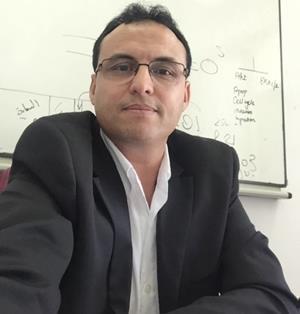Dr. Mohammad Haris

Dr. Mohammad Haris received his bachelor’s degree in life sciences with major in Chemistry, and later completed his master in Biochemistry. He earned his Ph.D. in Biomedical Imaging from Sanjay Gandhi Post Graduate Institute of Medical Sciences, Lucknow, India. Afterwards, he did his postdoctoral fellowship in the department of Radiology at the Perelman School of Medicine at University of Pennsylvania, Philadelphia, USA, and subsequently he became research scientist in the same department. During his tenure at Penn, he developed various novel MR imaging methods to image metabolites in vivo with potential applications in cancer, cardiovascular disorders, and neurological & neurodegenerative diseases. He was the first to develop an MR method for imaging cellular energetics by targeting creatine recovery kinetics using CEST MRI. Dr. Haris joined the research department at Sidra Medicine as a Principal Investigator in October 2013. Also, he holds Adjunct faculty appointments at the Perelman School of Medicine at University of Pennsylvania, Philadelphia, USA, and LARC, Qatar University.
In brief, Dr. Haris’s research focuses on developing and optimizing novel noninvasive MRI methods for diagnosing and studying physiological and functional aberrations in various human pathologies, ranging from cancer to neurological disorders. At Sidra, Dr. Haris and his lab members are venturing into new areas, such as developing new contrast methods in MRI, and methods for monitoring response to cancer immunotherapy in vivo.
Dr. Balaji Ramachandran

Dr. Balaji Ramachandran is a pharmacologist with 18 years of research experience in Oncology Drug Discovery & Research Platform. He is currently working as a Lead scientist at Syngene leading the invivo oncology group and managing anticancer therapeutic programs involving Xenograft & Syngeneic tumor models, Immuno-Oncology, Humanized Mice Platform, Patient derived xenografts (PDX), Translational Research (mouse co-clinical trials), PK/PD correlation and Preclinical In-vivo Small Animal Imaging. His research areas have expanded from the basic core research, including conventional animal models, to the current focus on human primary tumors and cancer stem cells, with the major goals of significantly improving clinical predictiveness & therapeutic efficacy of drugs. In his former role, he has significantly contributed to the preclinical development of novel epigenetic and signal transduction pathway inhibitors in oncology space. He has published 18 Scientific publications, 6 International patents (USPTO) as co-inventor, 2 Indian Patents, and13 abstracts. He has done his doctoral training in Pharmacology/Biotechnology from Dr.MGR University, Chennai, India and Master of Pharmacy in pharmacology from Tamil Nadu Dr. MGR medical university, Chennai, India and has done his MBA from IIPM, Lucknow, India. He is an active member in American Association for Cancer Research (AACR) and in European Association of Cancer Research (EACR).
Dr. Hamda Al Naemi
Dr. Hamda Al Naemi as a Physiologist, Founder Director of Laboratory Animal Research Center (LARC) at Qatar University received her Ph.D degree in Physiological Sciences from College of Medicine, University of Arizona,, USA. Dr. Hamda Al Naemi has more than 20 years of experience and been working as an assistant Professor at the department of Biological and Environmental sciences teaching Biology, Human physiology, Animal physiology, Anatomy, Histology , Immunology, and supervised several under graduate and graduate student research and thesis. As a member of American Physiologist Society, Dr. Hamda has years of experience in planning/managing multiple research projects in the field of cardiovascular physiology, obesity and diabetes. Dr. Hamda has published several research articles in peer reviewed journals. Dr. Hamda has been awarded Caroline tum Suden /Frances A Hellebrandt Professional Opportunity Award for Meritorious Research and best abstract presented in Experimental Biology Meeting, Washington DC, USA. Dr. Hamda has secured several major QNRF research grants and many UREP grants from Qatar Foundation. Dr. Hamda Al Naemi successfully established the first rodent animal facility in the country at Qatar University that holds different Rat and Mouse strains and transgenic animal models for research.
Dr. Shahab Uddin

Dr. Shahab Uddin is a Principal Research Scientist and Head of Molecular Pathophysiology Core, at Transnational Research Institute, Hamad Medical Corporation, Doha, Qatar. He is also an Adjunct professor of Cancer Biology at Laboratory of Animal Research center, Qatar University. He did pre-university in Biology, subsequently in 1982, graduated with BSc. Degree in Chemistry from the Aligarh Muslim University. He then received MSc, MPhil and Ph.D. degrees in Biochemistry from Aligarh Muslim University, India in 1984, 1986 and 1988 respectively. After completing his graduate degree, he joined the Ohio State University, Columbus, USA for postdoctoral training for two years (1989-1991). He worked in the area molecular biology of DNA. He joined Loyola University of Chicago, Illinois, USA, and worked from April1991-1995 under Molecular Biology Training Program. He received extensive training in the molecular biology of brain hormone as well signaling mechanism of interferon in leukemia. In 1996, he joined the University of Illinois at Chicago initially as Instructor and then as Research Assistant Professor in the Department of Medicine. He continued working in the area of interferon signaling. He joined the University of Chicago as Research Associate Professor and worked till 2003. In 2003, he joined King Faisal Specialist Hospital & Research Centre, Riyadh, KSA, as a Scientist initially (2003-2005) and subsequently promoted to Senior Scientist (2005) and deputy director of Human Cancer Genomic Program. Dr. Shahab contributed to the establishment of Human Cancer Genomic Program at King Faisal Specialist Hospital & Research Centre for translational research. Currently, he is working as Senior Scientist and Head of Molecular Pathophysiology section in Translational Research Institute at Hamad Medical Corporation, Doha, Qatar. Dr. Shahab Uddin published over 250 peer-reviewed articles in high impact factor journals. He has trained numerous postdoctoral fellows, Medical fellows, and graduate students. He has supervised numerous scientists, technicians, and students of different levels. He has served numerous scientific and administrative committees. He has been consciously reviewing manuscripts and grants proposals of international journal and agencies respectively. He has received numerous prestigious awards including Hamad Bin Rashid bin Al-Makhdoom award for original research, Adela Bent Abdullah award for Children Cancer research, Research excellence award continuously year 2016,2017 and 2018 from Hamad Medical Corporation, Doha, Qatar.
As of Jan 2022, based on Google scholar, he has 12918 citations with an h-index of 66 and i10-index 182. In 2020, he has been listed in world’s top 2% scientist in a global list released by Stanford University, USA.
Dr. Allal Ouhtit

Dr. Allal Ouhtit is a Professor of Biology and Functional Genomics within the Department of Biological & Environmental Sciences, College of Arts and Sciences at Qatar University. Dr. Ouhtit graduated from University Claude Bernard Lyon-I, France, with a PhD in Molecular/Cell Biology in 1995. He completed his postdoctoral fellowship at the International Agency for Research on Cancer (World Health Organization). He joined the MD Anderson Cancer Center, University of Texas, in Houston. In 2001, he was Lecturer at Queens University of Belfast, United Kingdom. In 2005, he joined the Louisiana State University Health Sciences Center and Stanley S Scott Cancer Center in New Orleans as a Principal Investigator. In 2009, he became the Head of Department of Genetics at Sultan Qaboos University in Oman and was promoted to Full Professor in 2014. The research of Dr. Ouhtit is mainly focused on identifying and validating genes and novel pathways that underpin the process of breast cancer cell invasion and metastasis. He has published several papers in high impact journals, including his paper published in the journal Science in 1999.
Dr. Fatemeh Darakhshan-Rassam
Dr. Fatemeh Darakhshan-Rassam is a Biomedical Sciences and Health Technical Programme Manager at the Qatar National Research Fund (QNRF). She is extensively involved in pre-award and post-award activities, as well as providing technical opinion in accordance with QNRF requirements.
Dr. Darakhshan-Rassam was awarded the higher degree of the Doctor of Philosophy (PhD) jointly from The University Reading, United Kingdom (UK), and the Health Protection Agency (formerly NRPB), Harwell Laboratories, Oxfordshire, UK.
Dr. Darakhshan-Rassam, gained further research experience when awarded a postdoctoral fellowship at the Sir Alastair Currie, CRUK, Molecular Medicine Centre, Edinburgh.
Prior to joining QNRF, her last appointment was as a National Health Service (NHS) Manager in the UK.